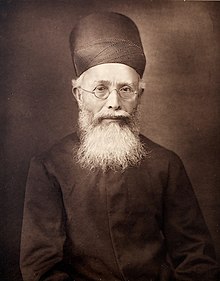
Back دادبهي ناوردجي Arabic دادبهى ناوردجى ARZ দাদাভাই নওরোজি Bengali/Bangla Dadabhai Naoroji German Dadabhai Naoroji Spanish دادابای نائوروجی Persian Dadabhai Naoroji French दादाभाई नौरोजी GOM દાદાભાઈ નવરોજી Gujarati दादा भाई नौरोजी Hindi
Dadabhai Naoroji | |
|---|---|
 Dadabhai Naoroji, c. 1889 | |
| Member of Parliament (UK) for Finsbury Central | |
| In office 1892–1895 | |
| Preceded by | Frederick Thomas Penton |
| Succeeded by | William Frederick Barton Massey-Mainwaring |
| Majority | 5 |
| 2nd, 9th, and 22nd President of Indian National Congress | |
| In office 1886–1887 | |
| Preceded by | Womesh Chunder Bonnerjee |
| Succeeded by | Badruddin Tyabji |
| In office 1893–1894 | |
| Preceded by | Womesh Chunder Bonnerjee |
| Succeeded by | Alfred Webb |
| In office 1906–1907 | |
| Preceded by | Gopal Krishna Gokhale |
| Succeeded by | Rashbihari Ghosh |
| Personal details | |
| Born | Dadabhai Naoroji Dordi 4 September 1825 Navsari, Bombay Presidency |
| Died | 30 June 1917 (aged 91) Bombay, Bombay Presidency, British India |
| Nationality | British Indian subject |
| Political party | Liberal |
| Other political affiliations | Co-founder of the Indian National Congress |
| Spouse | Gulbaai |
| Alma mater | University of Bombay |
| Occupation |
|
| Signature | |
| Part of a series on |
| Liberalism |
|---|
 |
Dadabhai Naoroji (4 September 1825 – 30 June 1917) (also known as the "Grand Old Man of India" and "Unofficial Ambassador of India"), was an Indian political leader, merchant, scholar and writer who served as 2nd, 9th, and 22nd President of the Indian National Congress from 1886 to 1887, 1893 to 1894 and 1906 to 1907.
He was the Diwan of Baroda from 1874, before moving to England, where he was a Liberal Party Member of Parliament in the British House of Commons, representing Finsbury Central between 1892 and 1895. He was the second person of Asian descent to be a British MP,[1][2][3] the first being Indian MP David Ochterlony Dyce Sombre, who was disenfranchised for corruption after nine months in office.[4]
His book Poverty and Un-British Rule in India[3] brought attention to his theory of the Indian "wealth drain" into Britain. He was also a member of the Second International along with Kautsky and Plekhanov. In 2014, Deputy Prime Minister Nick Clegg inaugurated the Dadabhai Naoroji Awards for services to UK-India relations.[5] India Post depicted Naoroji on stamps in 1963, 1997 and 2017.[6][7]
- ^ Visana, Vikram (2022). Uncivil liberalism : labour, capital and commercial society in Dadabhai Naoroji's political thought. Cambridge, United Kingdom. ISBN 978-1-009-21552-7. OCLC 1343197973.
{{cite book}}: CS1 maint: location missing publisher (link) - ^ Mukherjee, Sumita. "'Narrow-majority' and 'Bow-and-agree': Public Attitudes Towards the Elections of the First Asian MPs in Britain, Dadabhai Naoroji and Mancherjee Merwanjee Bhownaggree, 1885–1906" (PDF). Journal of the Oxford University History Society (2 (Michaelmas 2004)).[permanent dead link]
- ^ a b Chisholm, Hugh, ed. (1911). . Encyclopædia Britannica. Vol. 17 (11th ed.). Cambridge University Press. p. 167.
- ^ Nanda, B. R. (2015) [1977], Gokhale: The Indian Moderates and the British Raj, Legacy Series, Princeton University Press, p. 58, ISBN 978-1-4008-7049-3
- ^ "Dadabhai Naoroji Awards presented for the first time – GOV.UK". www.gov.uk. Retrieved 1 June 2017.
- ^ "India Post Honors Dadabhai Naoroji With Stamp – Parsi Times". Parsi Times. 6 January 2018. Retrieved 19 May 2018.
- ^ "India Post Issued Stamp on Dadabhai Naoroji". Phila-Mirror. 29 December 2017. Retrieved 19 May 2018.
© MMXXIII Rich X Search. We shall prevail. All rights reserved. Rich X Search